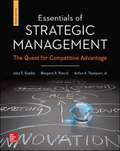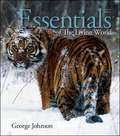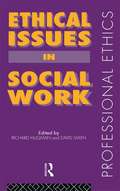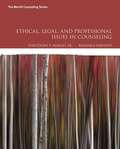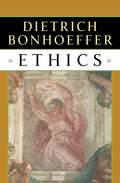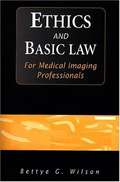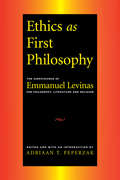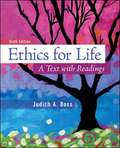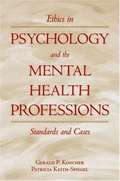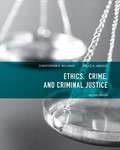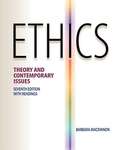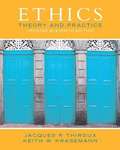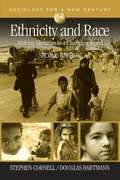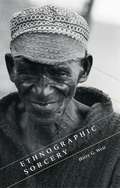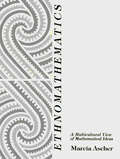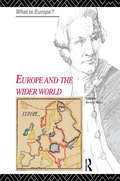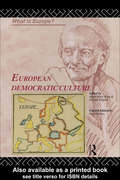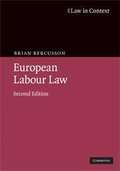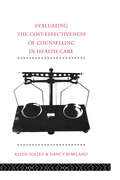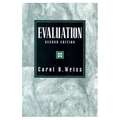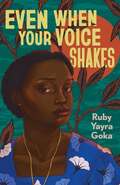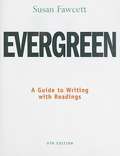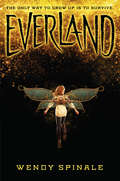- Table View
- List View
Essentials of Strategic Management: The Quest for Competitive Advantage (Fourth Edition)
by Arthur A. Thompson John E. Gamble Margaret A. PeterafThe text presents a conceptually strong treatment of strategic management principles and analytic approaches that features straight-to-the-point discussions and timely examples.
Essentials of Surgical Pediatric Pathology
by Marta C. Cohen Irene ScheimbergEssentials of Surgical Pediatric Pathology is a clear and practical yet comprehensive guide for trainee pediatric pathologists and non-pediatric pathologists.
Essentials of the Living World 4th Edition
by George B. JohnsonEssentials of The Living World is often considered a student favorite. George Johnson has written this non-majors textbook from the ground up to be an engaging and accessible learning tool with an emphasis on "how things work and why things happen the way they do". Essentials of The Living World focuses on concepts rather than terminology and technical information, and features a straightforward, clear writing style and a wide variety of media assets to enhance the content of the textbook.
Ethical Issues in Social Work (Professional Ethics)
by David Smith Richard HugmanIt has always been recognised that the practice of social work raises ethical questions and dilemmas. Recently, however, traditional ways of addressing ethical issues in social work have come to seem inadequate, as a result of developments both in philosophy and in social work theory and practice. This collection of thought-provoking essays explores the ethics of social work practice on the light of these changes. Ethical Issues in Social Work provides up to date critical analyses of the ethical implications of new legislation in community care and criminal justice, and of trends in social work thought and policy, such as managerialism, user empowerment, feminism and anti-oppressive practice. This study provides important and stimulating reading for social work students and their teachers, and for all practitioners and managers who are concerned about the ethical dimensions of their work.
Ethical, Legal, and Professional Issues in Counseling
by Barbara Herlihy Theodore P. RemleyThis authoritative resource, written by two counseling professors--one an attorney and the other an expert in ethics--explores the most difficult ethical, legal, and professional challenges in counseling in an easy-to-understand manner. Ideal for instructors who do not specialize in the topics presented, and for students who are learning about the counseling profession, Ethical, Legal, and Professional Issues in Counseling includes numerous case studies throughout not only to highlight difficult situations faced by counselors, but also to give readers the benefit of the authors' best thinking on how to resolve the dilemmas. The complex legal, ethical, and professional counseling issues are analyzed and discussed in a manner that allows counselors to resolve challenging situations as they arise in their practice. Included is practical advice on how to manage ethical and legal issues such as using technology and social media, counseling minors and vulnerable adults, counseling clients who may be suicidal or violent, responding to subpoenas; setting boundaries with clients, students, and supervisees serving as gatekeepers for the counseling profession; developing a private practice, responding to complaints, and practicing in a diversity-sensitive manner. The topics are relevant for school counselors, clinical mental health counselors, college counselors, rehabilitation counselors, marriage and family counselors, substance abuse counselors, and counselors who practice in other specialties. As a text it is appropriate for undergraduate, master's level, and doctoral level human services and counseling.
Ethics (Dietrich Bonhoeffer Works)
by Dietrich BonhoefferFrom one of the most important theologians of the twentieth century, Ethics is the seminal reinterpretation of the role of Christianity in the modern, secularized world.The Christian does not live in a vacuum, says the author, but in a world of government, politics, labor, and marriage. Hence, Christian ethics cannot exist in a vacuum; what the Christian needs, claims Dietrich Bonhoeffer, is concrete instruction in a concrete situation. Although the author died before completing his work, this book is recognized as a major contribution to Christian ethics. The root and ground of Christian ethics, the author says, is the reality of God as revealed in Jesus Christ. This reality is not manifest in the Church as distinct from the secular world; such a juxtaposition of two separate spheres, Bonhoeffer insists, is a denial of God’s having reconciled the whole world to himself in Christ. On the contrary, God’s commandment is to be found and known in the Church, the family, labor, and government. His commandment permits man to live as man before God, in a world God made, with responsibility for the institutions of that world.
Ethics and Basic Law for Medical Imaging Professionals
by Bettye G. WilsonComplies with ASRT curriculum guidelines requiring coverage of ethical theory, behavior, and dilemmas; legal responsibilities; and patient consent. Provides coverage of special issues, such as the impaired colleague and special patient populations, including the terminally ill patient and the patient with an infectious disease. Discussion questions facilitate classroom discussion and student analysis. Each chapter includes objectives and an end-of-chapter summary.
Ethics as First Philosophy: The Significance of Emmanuel Levinas for Philosophy, Literature and Religion
by Adriaan T. PeperzakIn Ethics as First Philosophy, Adrian P. Peperzak brings together a wide range of essays by leading international scholars to discuss the work of the 20th century French philosopher, Emmanuel Levinas. The first book of its kind, this collection explores the significance of Levinas' texts for the study of philosophy, psychology and religion. Offering a complete account of the most recent research on Levinas, Ethics as First Philosophy is an extraordinary overview of the various approaches which have been adopted in interpreting the work of a revolutionary but difficult contemporary thinker.
Ethics for Life (6th Edition)
by Judith A. BossA multicultural and interdisciplinary introductory ethics textbook that provides students with an ethics curriculum that has been shown to significantly improve student's ability to make real-life moral decisions.
Ethics in Psychology and the Mental Health Professions: Standards and Cases (3rd edition)
by Patricia Keith-Spiegel Gerald P. KoocherWe seek to present the full range of contemporary ethical issues in the mental health professions, not only as relevant and intriguing but also as integral and unavoidable aspects of the our complex professional roles and social responsibilities. Regardless of one's training speciality or the work setting, critical dilemmas will arise -- probably with some regularity--and we will often need to make challenging decisions or take intervention steps, sometimes right on the spot.
Ethics, Crime, and Criminal Justice (Second Edition)
by Christopher R. Williams Bruce A ArrigoThis comprehensive, provocative text meaningfully examines ethical theories and their application to current issues, controversies, and professional scenarios in law, crime, and justice. It introduces students to the foundations of the study of ethics and morality; examines prominent moral and ethical themes, conflicts, and struggles in criminology and criminal justice; and explores the conceptual and practical value of key ethical concepts, principles, and arguments. This edition is extensively updated and revised for greater clarity, cohesiveness, and accessibility. An all-new chapter demonstrates practical application of normative frameworks to ethical dilemmas, and another largely new chapter introduces game theory, evolutionary psychology, and related concepts. Readers will find expanded discussions of social contract, cognitive neuroscience, Carol Gilligan's ethic of care, and much more.
Ethics: Theory and Contemporary Issues (7th Edition)
by Barbara MackinnonClosely examine the major areas of ethical theory as well as a broad range of contemporary moral debates using MacKinnon's acclaimed Ethics: Theory and Contemporary Issues, Seventh Edition. Illuminating overviews and a selection of readings from both traditional and contemporary sources make even complex philosophical concepts reader friendly. Comprehensive, clear-sighted introductions to general and specific areas of ethical debate cover major ethical theories, including feminist ethics, contract theory, and ethical relativism, before delving into issues ranging from euthanasia and sexual morality to war and globalization. A broader range of voices and philosophical traditions in this edition includes continental and non-Western philosophers, with new readings from prominent ethicists. Increased coverage of contemporary dilemmas highlights issues of widespread interest, including torture and terrorism, "partial birth" abortion, cloning, same-sex marriage, and global distributive justice. An innovative online resource center offers, among other things, animated simulations. These simulations allows you to personally engage with dilemmas and thought experiments commonly presented in introduction to ethics classes and provide instructors with a way to seamlessly integrate online assignments into the class.
Ethics: Theory and Practice
by Jacques P. Thiroux Keith W. KrasemannWith a clear presentation, Ethics: Theory and Practice educates readers about ethical theory and applies concepts to classic and contemporary moral problems (lying, cheating, establishing ethical business practices, honoring ethical obligations in medicine, etc. ). This title educates readers about ethical theory and its applications in a way that beginning students can understand. Ethics is neither technical nor does it plunge readers into complex readings without sufficient background. This title is fully updated with global issues and non-Western ethical views. Besides updating the foundations of the book, the author incorporates new and relevant material, most of which is often unique only to this title.
Ethnicity and Race: Making Identities in a Changing World
by Douglas Hartmann Stephen CornellCornell (sociology, U. of Arizona) and Hartmann (sociology, U. of Minnesota, Minneapolis) present an updated edition of their textbook for advanced undergraduate courses on race and ethnicity in the departments of sociology, ethnic studies, global studies, and anthropology. Revised throughout with new illustrative or empirical materials and updated references, the text includes new discussion of assimilation, the invisibility of racial dominance, and paradigms and analytical frames for understanding group relations, and a new case study on race, culture, and belonging in contemporary France. Annotation ©2007 Book News, Inc., Portland, OR (booknews.com)
Ethnographic Sorcery
by Harry G. WestAccording to the people of the Mueda plateau in northern Mozambique, sorcerers remake the world by asserting the authority of their own imaginative visions of it. While conducting research among these Muedans, anthropologist Harry G. West made a revealing discovery---for many of them, West's efforts to elaborate an ethnographic vision of their world was itself a form of sorcery. In Ethnographic Sorcery, West explores the fascinating issues provoked by this equation. A key theme of West's research into sorcery is that one sorcerer's claims can be challenged or reversed by other sorcerers. After West's attempt to construct a metaphorical interpretation of Muedan assertions that the lions prowling their villages are fabricated by sorcerers is disputed by his Muedan research collaborators, West realized that ethnography and sorcery indeed have much in common. Rather than abandoning ethnography, West draws inspiration from this connection, arguing that anthropologists, along with the people they study, can scarcely avoid interpreting the world they inhabit, and that we are all, inescapably, ethnographic sorcerers.
Ethnomathematics: A Multicultural View of Mathematical Ideas
by Marcia AscherIn this truly one-of-a-kind book, Ascher introduces the mathematical ideas of people in traditional, or ""small-scale"", cultures often omitted from discussion of mathematics. Topics such as ""Numbers: Words and Symbols"", ""Tracing Graphs in the Sand"", ""The Logic of Kin Relations"", ""Chance and Strategy in Games and Puzzles"", and ""The Organization and Modeling of Space"" are traced in various cultures including the Inuit, Navajo, and Iroquois of North America; the Inca of South America; the Malekula, Warlpiri, Maori, and Caroline Islanders of Oceania, and the Tshokwe, Bushoong, and Kpelle of Africa.As Ascher explores mathematical ideas involving numbers, logic, spatial configuration, and the organization of these into systems and structures, readers gain both a broader understanding and anappreciation for the idease of other peoples.
Europe and the Wider World (What is Europe?)
by Bernard WaitesThis book examines the concept of Europe in its relations to those areas of the globe beyond its borders. In particular it is concerned with the historical evolution and contemporary setting of Europe vis-a-vis The United States of America, the developing world and the former Soviet Union. This involves drawing on the perspectives of international history, politics and economics.A unifying feature of the analysis included here is provided by the fact that the "bi-polar world" that emerged in the aftermath of the Second World War has effectively been brought to an end with the collapse first of Soviet control in Eastern Europe, and then by the break-up of the Soviet Union itself and a prospective reduction of American influence in western Europe. What will Europe look like in an increasingly "multi-polar world"? An answer to this depends not only on the evolving external connections between Europe and other parts of the world but also on the internal development of European political and economic integration. The dynamic of this crucial dual relationship is examined here.
European Democratic Culture (What is Europe? #Bk. 3)
by Alain-Marc Rieu Gérard DupratThese essays go beyond conventional studies of the institutions and parties of Europe to address Europe's democractic future more widely.While the book does offer an analysis of the democratic institutions of European countries, identifying common features and differences, as the editors put it, "institutions cannot function alone, like machines to produce concensus". So the book focuses on the fundamentals of European democratic culture. The authors argue that European social life and scientific learning have been indispensable components in the growth of the shared values that democracy pursues. They also analyse the dynamic tension brought to the life of democractic institutions by law, the desire for freedom, and critical public debate.With Europe engaged in perpetual self-examination, and rapid change, this book provides insights into its democractic past and prognosticates for its democratic future.
European Labour Law
by Brian BercussonEuropean Labour Law explores how individual European national legal systems, in symbiosis with the European Union, produce a transnational labour law system that is distinct and genuinely European in character. Professor Brian Bercusson describes the evolution of this system, its national, transnational and global contexts and its institutional and substantive structures. The collective industrial-relations dimension of employment is examined, and the labour law of the EU as manifested in, for example, European works councils is analysed. Important subjects which have traditionally received little attention in some European labour law systems are covered, for example, the fragmentation of the workforce into atypical forms of employment. Attention is also given to the enforcement of European labour law through administrative or judicial mechanisms and the European social dialogue at intersectoral and sectoral levels. This new edition has been extensively updated, as the EU's influence on this area of social policy continues to grow.
European Warfare, 1494-1660 (Warfare and History)
by Jeremy BlackThe onset of the Italian Wars in 1494, subsequently seen as the onset of 'modern warfare', provides the starting point for this impressive survey of European Warfare in early modern Europe. Huge developments in the logistics of war combined with exploration and expansion meant interaction with extra-European forms of military might. Jeremy Black looks at technological aspects of war as well social and political developments and effects during this key period of military history. This sharp and compact analysis contextualises European developments and as establishes the global significance of events in Europe.
Evaluating the Cost-Effectiveness of Counselling in Health Care
by Nancy Rowland Keith TolleyLimited resources in health care mean that the value of counselling is decided in a highly competitive economic arena. Keith Tolley and Nancy Rowland have written a practical guide to the basic principles of evaluating cost-effectiveness to enable counsellors and service providers to carry out analysis for themselves. They provide helpful definitions of technical terms and use case studies to demonstrate how to apply the theory in different contexts.
Evaluation: Methods for Studying Programs and Policies
by Carol H. WeissThis timely and accessible guide on the conduct of evaluation studies explores how we apply research methods in evaluating social programs, illustrating its points with reference to a variety of fields, including education, social services, and criminal justice. Offers practical advice on understanding the reasons for the study, identifying key questions to be answered, and planning and implementing the overall design of the study, including measurement, qualitative methods of inquiry, data collection, analysis, reporting, and dissemination. Stresses that understanding the underlying theory of the program is essential to developing the most appropriate evaluation, and emphasizes the need to take ethical considerations into account all along the course of the study. Covers meta-analysis, cost-benefit analysis and includes a non-technical discussion of the logic of data analysis. Includes references to further sources on measurement, existing longitudinal data sets, statistics, and qualitative analysis. For professionals in psychology, sociology, public health, public policy/affairs, education, and criminal justice.
Even When Your Voice Shakes
by Ruby Yayra GokaA young woman speaks out against her wealthy abuser in this riveting YA novel from one of Ghana’s most celebrated children’s book authors. <p><p> When Amerley is offered a job working for one of her mother’s old school friends, she knows she has to accept. Her wages will feed her family, help her sisters stay in school, and ensure that her mother won’t have to worry about them. Amerley’s move to Accra isn’t easy, but she soon settles into her new life away from her small village—until she is raped by the son of her employer. Torn between keeping quiet to keep her job and speaking up for herself and for justice, Amerley must decide how to live her truth, and the impact of her choice will be felt through her entire community. <p><p> Through the life of an ordinary girl from a small country village, Even When Your Voice Shakes exposes the damage wrought by institutionalized misogyny and poverty and reveals how even those who are most disadvantaged are never without their own power.
Evergreen: A Guide to Writing with Reading (9th edition)
by Susan FawcettEVERGREEN combines carefully crafted instruction, high-interest readings and student models, and plentiful practice exercises, to provide the most effective paragraph-to-essay-level Developmental Writing text on the market. The Ninth Edition includes expanded and revised coverage of writing essays, including an additional essay chapter and numerous additional student models. Photos enhance high-interest readings and promote critical viewing as well as critical thinking and clear writing.
Everland: A Prequel Novella To Everland (Everland #1)
by Wendy SpinaleForget the story of Peter Pan and Wendy you know. Because in Everland, the only way to grow up is to survive.London has been destroyed in a blitz of bombs and disease. The only ones who have survived are children, among them Gwen Darling and her siblings, Joanna and Mikey. They spend their nights scavenging and their days avoiding the ruthless Marauders -- the German Army led by Captain Hanz Otto Oswald Kretschmer. Unsure if the virus has spread past England's borders but desperate to leave, Captain Hook hunts for a cure, which he thinks can be found in one of the survivors. He and his Marauders stalk the streets snatching children for experimentation. None ever return. Until the day they grab Joanna. As Gwen sets out to save her, she meets a daredevil boy named Pete. Pete offers the assistance of his gang of Lost Boys and the fierce sharpshooter Bella, who have all been living in a city hidden underground. But in a place where help has a steep price and every promise is bound by blood, it will cost Gwen. And are she, Pete, the Lost Boys, and Bella enough to outsmart Captain Hook?
